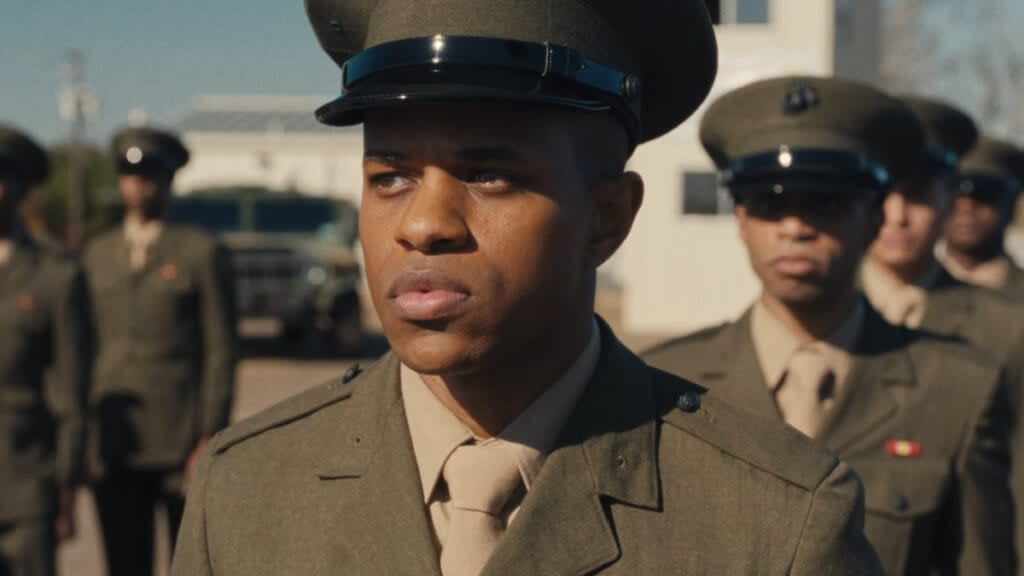‘The Inspection’ Review: Military Coming-of-Age Drama Feels Like an Instant Queer Classic

This review originally ran September 13, 2022, in conjunction with the film’s premiere at the Toronto International Film Festival.
Much like “Moonlight,” “The Inspection” has the trappings of an instant queer classic.
Premiering at the Toronto Film Festival, writer-director Elegance Bratton’s semi-autobiographical film, about a young gay Black man’s desire for approval and human connection in an unforgiving environment poisoned by bigotry and toxic masculinity, tells essential truths about the state of queer life in America outside gay villages and other safe spaces. Yet stories like these have seldom been told even as queer cinema has steadily evolved beyond homogeneous narratives.
Bratton’s avatar, Ellis French (Jeremy Pope, Netflix’s “Hollywood”), has been living in a homeless shelter for years. He visits his mother, Inez (Gabrielle Union), to retrieve his birth certificate in order to join the Marine Corps. With the door still chained, Inez hands over his mail, including a court summons. When she finally lets him in, she’s neither warm nor welcoming. She sets newspapers on the couch as if he might soil the furniture. It becomes apparent that she disowned him five years prior over his sexual orientation.
At the shelter, Ellis shaves with a disposable razor in preparation for his enlistment while a nearby junkie shoots up. Shamus (Tyler Merritt), a queer elder, questions Ellis about his decision. (“The Inspection” is set in the aftermath of 9/11, with the military’s “Don’t Ask, Don’t Tell” policy firmly in place.) Like Inez, Shamus tells Ellis he does not wish to see him again, except that Shamus clearly says so from a place of love.
Also Read:
‘The Eternal Daughter’ Review: Tilda Swinton Plays Mother and Daughter in Ghostly ‘Souvenir’ Sequel
The remainder of the film chronicles the grueling four-month basic training under the unethical and sadistic drill sergeant Laws (Bokeem Woodbine), an Operation Desert Storm veteran who aims to break the recruits, molding those who can take it and weeding out any weaklings. Unable to conceal his secret for long, Ellis also carries the additional burden of his fellow recruits’ bullying and brutal beatdowns. The film readily brings to mind “Full Metal Jacket,” which Bratton cites as one of his influences.
Another he references is “Beau Travail,” when depicting Ellis’ longings in a single-sex space. Bratton is much more explicit than Claire Denis during a couple of fantasy sequences, one of which ends abruptly with Ellis getting pummeled in the shower. There are a couple of instances like this, where viewers don’t get a clear sense of what’s going on before the situation suddenly escalates to violence.
Bratton deftly depicts a young gay man’s confusion regarding his many longings — for love, affection, friendship, camaraderie, guidance, approval, sex, and more — and his inability to separate and compartmentalize each. Ellis has a crush on drill sergeant Rosales (Raúl Castillo, “Cha Cha Real Smooth”), who is tough yet caring. Perhaps out of loneliness and desperation, Ellis mistakes Rosales’ kindness for reciprocation of his affections. This kind of introspection and insight is rare in cinema, and Pope and Castillo carry out the ambiguity of this relationship perfectly.
Also Read:
‘Lady Chatterley’s Lover’ Review: Fresh Take on D.H. Lawrence Classic Doesn’t Skimp on Eroticism
What immediately makes Bratton stand out from most filmmaking neophytes is the fact that he had some life experience under his belt before enrolling in film school, and he knows a bit about the way of the world that isn’t taught as part of the curriculum. While novice directors (this is the first fictional narrative filmmaker from documentarian Bratton) sometimes blow their first shots on projects that come across as navel-gazing, the director hits no false notes. He knows firsthand the feelings each scene should convey, but he also has the skills to render them accurately.
The performances are uniformly terrific: Tony- and Emmy-nominee Pope seems primed for movie stardom with this turn. He captures the nuance and complexity of someone who doesn’t naturally project manliness, adjusts to fit in hypermasculine environs, and slips up occasionally. It’s a tightrope act, and Pope balances masterfully.
Nearly unrecognizable playing against type, Union stuns in the equally challenging role of a mother torn between her maternal instincts and her religious beliefs. Woodbine hasn’t been afforded a part this showy in his prolific career, and his portrayal here may raise his acting profile considerably. Another revelation is Castillo, who impressively calibrates different layers of the same character seen in public, in private and in Ellis’ fantasy.
Also Read:
‘Sr.’ Review: Robert Downey, Senior and Junior, Capture the End of the Patriarch’s Life
In the film’s climax, Ellis stands up and fights back. This act of aggression earns Ellis his peers’ respect, and Laws takes twisted pleasure in witnessing that he has successfully transformed the young recruit into a monster. It’s also a tremendously gratifying moment for viewers, who have been rooting for Ellis, and it purposely prompts soul searching on the legitimization of toxic masculinity and violence in military, law enforcement, sports, action flicks and other areas, and our glorification and worship of the “good guys” who partake in brutal acts.
This is a truly exciting time for queer cinema, with high-caliber films like “The Inspection” and “Fire Island” that will surely stand the test of time. Not only are the genres diverse, the stories also elevate the voices and experiences of gay men of color who have been neglected in mainstream representation for way too long.
“The Inspection” opens in U.S. theaters Nov. 18 and more widely Dec. 2.


